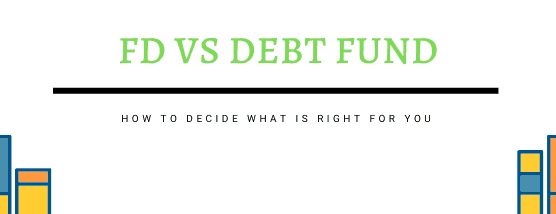When you first hear about FD vs Debt Fund comparison, the first thought that comes to the mind is why people invest in FD at all?
Isn’t it? At least that is the thought that came to my mind. I was like, why not to shift all my FD money to top debt fund? and other things.
FD vs Debt Fund is not a simple straightforward decision. It depends a lot on your time frame, tax bracket and overall market conditions. This guide delves deep into all the factors which will help your decide which one to invest into.

Fixed Deposits – Most popular & secure investment
Fixed Deposits in the banks are most popular form of secure investments. You get higher interest than your savings account and there is no fee is charged for such investment.
And you can chose the time frame according to your needs. Of course you get higher interest if time duration is longer.
To give you an idea, here is the FD return of major banks over span of 1, 3 & 5 years:
| Bank | 1 Year | 3 Years | 5 Years |
| SBI | 5.80 % | 6.25 % | 6.25 % |
| HDFC Bank | 6.30 % | 6.40 % | 6.30 % |
| ICICI Bank | 6.20 % | 6.40 % | 6.40 % |
| Axis Bank | 6.40 % | 6.50 % | 6.50 % |
These interests are published on bank’s websites. Changes are published and valid for all the FD booked after the effective date.
Once a FD is booked at certain interest rate, then that interest is valid for the entire duration of that FD. It doesn’t change according to current FD rates.
This, whole concept of knowing the return right at the beginning of investment, makes FD one of the most popular secure form of investments.
But, are they really the best choice for secure investments? And do you really get the best return of your investments?
How secure is FD investment?
The first thing to tackle is that we automatically assume that Fixed Deposits with banks are secure. Well, that is not completely true.
As with banking regulations(DICGC), each deposit with bank is only secured upto ₹ 1,00,000 (one Lakh). That’s it.
Many investors in 2019 found it hard way. Livemint coverage on PMC metldown.
In simple terms, if anything happens to the bank, for any reason, your investments and savings in the bank are insured only upto the amount of ₹ 1,00,0000/-.
And this includes FD also.
Of course, such situations are rare and RBI is taking steps to ensure that banks are operating within guidelines.
FD interest vs inflation is it enough on year to year basis?
FD rates are usually between 6-8%. Longer the lock in period, higher the interest.
Currently, inflation is around 5.5%. And here is the number for inflation from official government of India site.

With average inflation of 5% and FD rates mentioned above, you are getting around 1% return on your investment. It can be negative in case of higher inflation.
And tax deduction is still there.
Interest income earned on FD is taxed. And this tax is done every year, because the interest earned is considered as part of your current year’s income.
Whereas this is not same with Debt funds.
Debt Funds: Potential for higher earning with safe investments
Debt Funds are specialised funds for investment in safe investments like Government of India Bonds, Treasury Bonds, RBI Bonds, Money Market & High rated corporate bonds.
Most of these investments are of short time duration. Which means, money is free to be reinvested in next investment.
This is done along with interest earned.
Overall what it does is increase the interest income earned in a year.
Here is the Returns earned by few top rated debt funds over span of 1 year, 3 year & 5 years:
| Name | 1 Year | 3 Year | 5 Year |
| IDFC All Seasons Bond Fund | 11.53% | 8.28% | 8.58% |
| HDFC Short Term Debt Fund | 10.81% | 8.23% | 8.57% |
| Kotak Bond Short Term Fund | 11.16% | 8.32% | 8.86% |
As you can see, interest income earned is quite high as compared to FD rates mentioned above.
And if you invest for more than 1 year, your income from debt fund is taxed differently.
Still Debt funds are not clear winner in FD vs Debt fund discussion.
How secure is Debt investment?
Here is the main thing. Debt Funds are mutual funds only. And, mutual funds investments are subject to market risk.
Same is true for Debt funds too.
Though they invest in safer investment instruments. Still certain kind of risk is there and there is no insurance safety in any debt fund.
IL&FS, DHFL are few of the cases where even Debt Funds lost money.
Thus, the best way to ensure capital safety is to invest in funds which are focussed on high quality secured bonds.
FD vs Debt Fund: Who is the winner?
Both Fixed deposits and Debt Funds have their pros and cons.
Here are the 3 important factors you need to consider to decide which one serves your purpose best:
1. Tax factor
Wether FD or Debt fund, when you invest for upto 3 years, interest earned is included in current income.
Which means, if the interest earned in that year doesn’t change your tax bracket, then you both FD and Debt funds income is taxed with same rate.
Here is the tax table for both FD and Debt Fund:
Instrument | 1 Year | >1 year & < 3 Year | > 3 Year |
| Tax on FD interest | As per your tax bracket | As per your tax bracket | As per your tax bracket |
| Tax on Debt Fund | As per your tax bracket | As per your tax bracket | 20% with indexation benefit |
In long term, in FD vs Debt fund, it is debt fund that provides better returns as compared to FD.
Besides, if you are planning to invest in FD for more than 3 years, then Debt funds are clearly better choice. Both from returns and tax perspective.
2. Fund requirements
You need to consider this factor when you have funds now, but need different amount at different point of time in future.
In case FD, you can simply book multiple deposits with their maturity chosen according to funds requirements.
This is not the case with Debt fund. If you invest in the fund, then exiting can’t be divided. You need to pay the exit load, to exit the fund before the minimum lock in period.
3. Your age and financial goals
When you are young, you have time in your favour.
Which means, even if overall economy is weak and interests rates are not in favour, you will be able to sail through it nonetheless.
In such cases, it is always recommended to invest a part of your investments in Debt funds. This is true even if you are 50 years plus of age.
But same is not true when you are pushing 60, because now you have needs which are more or less fixed and thus you need more controlled income.
Same is true when you consider the time duration between today and your next financial goal which is dependent on the fund.
Balanced way to invest in FD vs Debt Fund struggle
A good plan will be to invest your secure investments in FD for durations below 1 year and in Debt Funds for durations more than that.
What it does is give probably higher returns for money that you don’t need to next 1 year whereas giving you access to your emergency funds in FDs.
Or, as thumb rule you use follow method:
If you need funds within 1 year, then debt funds provide volatile returns, so invest in FD. But, if you hold them for around 3 year or more, Debt Funds provide consistently better return.
Frequently Asked Questions
Due to their higher returns & nearly same safe investments, Debt Funds are best alternatives to Fixed Deposits (FD). For time period longer than 3 years, Debt Funds provide both higher returns and tax savings.
They both are equally good. You need to look at duration, time required and funds requirements to see which one is right choice for time being.
If you need funds within 1 year, then debt funds provide volatile returns, so invest in FD.
But, if you hold them for around 3 year or more, Debt Funds provide consistently better return.
